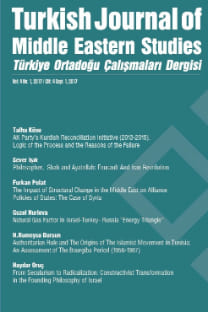İngiltere’nin Körfeze Yönelik PostKolonyal Dış Politikası (1971-1991): Alternatif Bir Yaklaşım
İngiltere’nin 1971’de Basra Körfezi’nden çekilmesi ile bölgede yeni bir siyasi düzen ve güvenlik haritasının ortaya çıktığı yeni bir dönem başlamıştır. İran ve Suudi Arabistan bölgede İngiltere’nin bıraktığı güç boşluğunu doldurma yolunda bölgesel statükonun korunması görevini üstlenmişlerdir. İngiltere bu yeni dönemde yeni post-kolonyal dış politikası ile birlikte bölgede imparatorluk sonrası yeni bir rol üstlenmiştir. Bu makalede İngiltere’nin Körfez güvenliğine yönelik dış politikası özellikle İran Devrimi sonrasında ortaya çıkan politika kaymasına odaklanarak incelenmektedir. 1979’dan itibaren batı ile olan ittifakı sona eren İran, İngiliz dış politikasında bölgesel güvenliğin önündeki başat iç tehdit olarak tanımlanmıştır. İngiltere’nin dış politikasındaki bu değişim mezhepçi bir söylemin benimsenmesi ile ortaya çıkmıştır. Bu makalede İngiltere’nin bölgeye yönelik dış politikasında, Körfez’in Anglo-Amerikan ittifakı çerçevesinde “İran tehdidi” ekseninde güvenlikleştirilmesi paralelinde benimsenen mezhepçi yaklaşıma dikkat çekilmektedir. İngiltere, mezhep ayrımcılığını provoke etmeye yönelik bir söylemi Körfez ülkeleri ile ilişkilerinde, özellikle İran-Irak Savaşı ve onu takip eden Körfez Savaşı ile derinleşen bölgenin güvenlikleştirilmesinde etkin bir araç olarak kullanılmıştır.
Britain’s Post-Colonial Foreign Policy Towards Persian Gulf Security (1971-1991): An Alternative Approach
British withdrawal from the Persian Gulf in 1971, started a new era in the regionwith new political order and new security map. Iran and Saudi Arabia emerged asthe guardians of the status quo to be filling the power vacuum left by the Britishin behalf of the West. Britain adopted a new post-imperial role in the region alongwith new post-colonial foreign policy in the post-withdrawal context. Britishpolicy towards the regional security is analysed in this article with central focus onthe shift emerged in the aftermath of the Iranian Revolution in the British policy.After 1979, Iran, no longer a Western ally, has been defined as the major internalthreat for the regional security following the major external threat of the Sovietexpansion in the British foreign policy. This paper argues that the shift in theBritish policy came along with a sectarianist approach towards the region. Thesectarianization emerged with the securitization of the Gulf based on “Iran threat”within the determinants of the Anglo-American alliance on the regional security.The sectarianist discourse adopted by the British foreign policy was employedas an effective tool of the securitization of the Gulf that was deepened during theregional conflicts, the Iran-Iraq War and the Gulf War.
___
- Ayoob, Mohammed, “American Policy Toward the Persian Gulf”, in International Politics of the Persian Gulf, edited by Mehran Kamrava, 120-143, Syracuse University Press, 2011.
- Bismarck, Helene Von, “The Kuwait Crisis of 1961 and Its Consequences for Great Britain’s Persian Gulf Policy”, British Scholar, Vol. II, Issue 1 (September 2009), 75-96.
- Esposito, John L., “The Iranian Revolution: A Ten Year Perspective”, in The Iranian Revolution Its Global Impact, edited by John L. Esposito, 17- 39, Miami: Florida University, 1990.
- Esposito, John L. “The Global Impact of the Iranian Revolution”, in The Iranian Revolution, Its Global Impact, edited by John L. Esposito, 317- 328, Miami: Florida University, 1990.
- Fierke, Karin M. Critical Approaches to International Security. Wiley, 2015.
- Gause III, Gregory F. The International Relations of the Persian Gulf. Cambridge University Press, 2009.
- Gause III, Gregory F. Oil Monarchies, Domestic and Security Challenges in the Arab Gulf States. New York: Council on Foreign Relations Press, 1994.
- Hollis, Rosemary. Britain and the Middle East in the 9/11 Era. WileyBlackwell, 2010.
- Hollis, Rosemary. “Britain’s Strategic Approach to the Gulf”, in International Interests in the Gulf Region, ECSSR, 2004. Hurd, Douglas. Memoirs. Abacus, 2004.
- Kamrava, Mehran. Iran’s Intellectual Revolution. Cambridge University Press, 2008.
- Long, David, E., “The Impact of the Iranian Revolution of the Arabian Peninsula and the Gulf States”, in The Iranian Revolution Its Global Impact, edited by John L. Esposito, 100-116, Miami: Florida University, 1990.
- Macris, Jeffrey R. The Politics and Security of the Gulf, Anglo-American Hegemony and Shaping of A Region. Routledge, 2010.
- Muttam, John, Arms and Insecurity in the Persian Gulf. Radiant Pubishers, 1984.
- Nonneman, Gerd. “Constants and Variations in Gulf-British Relations”, in Iran, Iraq an Arab Gulf States, edited by Joseph Kechichian, 325-330. Palgrave, 2011.
- Oktav, Ozden Zeynep, “The Gulf States and Iran: A Turkish Perspective”, Middle East Policy, Vol. XVIII, No 2 (Summer 2011), 136-147.
- Parsons, Anthony “The Middle East”, in British Foreign Policy under Thatcher, edited by Peter Byrd, 76-96, Philip Allan Publishers Limited, 1988.
- Parsons, Anthony. From Cold War to Hot Peace, UN Interventions (1947- 1995). Penguin Books, 1995.
- Peterson, Tore, “Richard Nixon, Great Britain and the Anglo-American Strategy of Turning the Persian Gulf into an Allied Lake”, in Imperial Crossroads. The Great Powers and the Persian Gulf, edited by Jeffrey R. Macris and Saul Kelly, 77-89, Naval Institute Press, 2012.
- Peterson Tore. Anglo-American Policy towards the Persian Gulf 1978- 1985. Sussex Academic Press, 2015.
- Potter, Lawrence, G. Society in the Gulf: Before and After Oil. Center for International and Regional Studies, Georgetown University, Occasional Paper No: 18, 2017.
- Rajaee, Farhang. “Iranian Ideology and Worldview: The Cultural Export of Revolution”, in The Iranian Revolution, Its Global Impact, edited by John L. Esposito, 63-83, Miami: Florida University, 1990.
- Smith, Simon C. “America in Britain’s place?’: Anglo-American relations and the Middle East in the aftermath of the Suez crisis’. Journal of Transatlantic Studies (Routledge), Vol. 10 Issue 3 (Sep 2012), 260-261.
- Zahlan, Rosemarie Said. The Making of the Modern Gulf States. Ithaca, 1998.
- ISSN: 2147-7523
- Başlangıç: 2014
- Yayıncı: Sakarya Üniversitesi Ortadoğu Enstitüsü adına Ali Balcı
Sayıdaki Diğer Makaleler
Enerji ve Güvenlik Ekseninde Türkiye-Irak İlişkileri (1990-2018)
Tolga DEMİRYOL, Hasan Deniz PEKŞEN
Türk Dış Politikasında Karar Alıcıların Ortadoğu Algısı: 1957-1958 Krizleri
Türkiye’nin Suriye Politikası: Değişmeyen Hedefler, Değişen Öncelikler
Muhittin ATAMAN, Çağatay ÖZDEMİR
İngiltere’nin Körfeze Yönelik Post- Kolonyal Dış Politikası (1971-1991): Alternatif Bir Yaklaşım
Suriye’nin Kürt Meselesinin Tarihsel Seyri (1946-2011)
Parlamenter Sistemde Başkanlık Dış Politikasını Şekillendirmek: Erdoğan ve Muhtarlar Toplantıları
İngiltere’nin Körfeze Yönelik PostKolonyal Dış Politikası (1971-1991): Alternatif Bir Yaklaşım
Türkiye’nin Dış Politikası Yeni Eğilimleri, Yeni Yönelimleri, Yeni Yaklaşımlar
